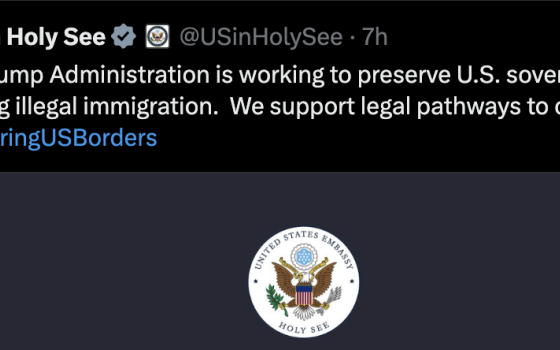
Pope Francis greets visitors gathered in St. Peter's Square at the Vatican to pray the Angelus Oct. 15. (CNS/Vatican Media)
Although it is easy to feel powerless in the face of war, "prayer is the meek and holy force to oppose the diabolical force of hatred, terrorism and war," Pope Francis said.
With violence continuing in the Holy Land, Ukraine and Nagorno-Karabakh, the pope repeated his calls for peace and for prayers Oct. 15 after reciting the Angelus prayer with visitors in St. Peter's Square.
"I continue to follow with great sorrow what is happening in Israel and Palestine," he told an estimated 22,000 people in the square.
Francis again called on Hamas to release the more than 100 hostages, including children, they have claimed to be holding since their assault on Israel Oct. 7.
"I strongly ask that children, the sick, the elderly, women and all civilians not be made victims of the conflict," he said.
And as Israeli appeared to be preparing an invasion of northern Gaza, ordered hundreds of thousands of civilians to move south and tightened its blockage on supplies into Gaza, Francis insisted that "humanitarian law is to be respected, especially in Gaza, where it is urgent and necessary to ensure humanitarian corridors and to come to the aid of the entire population."
"Brothers and sisters, already many have died," he said. "Please, let no more innocent blood be shed, neither in the Holy Land nor in Ukraine, nor in any other place! Enough! Wars are always a defeat, always!"
Advertisement
Before reciting a Hail Mary for peace, the pope asked Catholics to join with Christians in the Holy Land and mark Oct. 17 as a day of prayer and fasting for peace.
The pope also expressed concern for the ongoing crisis in Nagorno-Karabakh, an Armenian-majority enclave captured by Azerbaijan's troops in late September. More than 100,000 ethnic Armenians fled.
"In addition to the humanitarian situation of the displaced people — which is serious — I would also like to make a special appeal for the protection of the monasteries and places of worship in the region," Francis said. "I hope that, starting with the authorities and all the inhabitants, they can be respected and protected as part of the local culture, expressions of faith and a sign of a fraternity that makes it possible to live together despite differences."
In his main audience talk, Francis looked at the day's Gospel reading, St. Matthew's parable of the wedding feast where the invited guests thought they were too busy to show up.
"Brothers and sisters, how many times do we fail to heed God's invitation because we are intent on our own affairs?" the pope asked.
"Often," he said, "we struggle to have free time, but today Jesus invites us to find the time that frees: the time to dedicate to God, time that lightens and heals our hearts, that increases peace, confidence and joy in us, that saves us from evil, loneliness and loss of meaning."
Opportunities to be with God and with the people he loves are plentiful, the pope said, pointing to the Mass, to personal Bible reading, helping the poor, keeping a lonely person company or consoling someone who is suffering.




